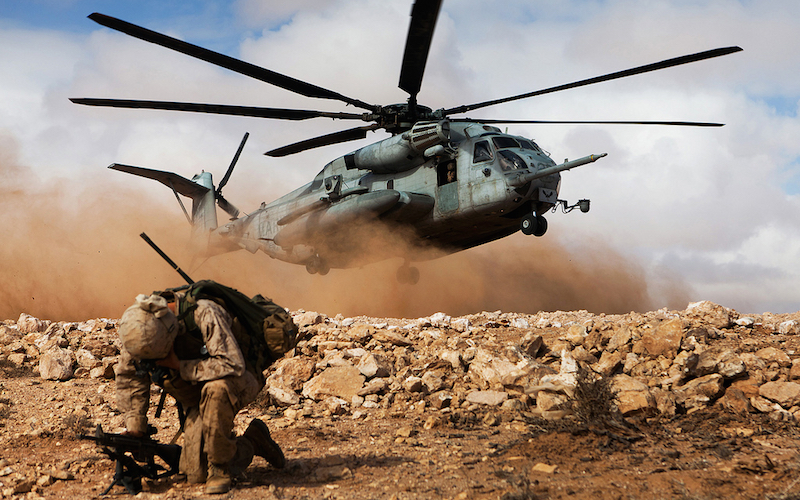
How the U.S. is Expanding its Fight Against Extremism in Africa
From the perspective of a US national security specialist, we live in a dark and gloomy world. Numerous worldwide threats exist across almost every part of the planet including China, Iran, North Korea and Russia. This typically puts Africa at the bottom of the pecking order.
But America is taking more notice of the African continent due to the expansion of extremist organisations operating in Africa like al-Qaeda, al-Shabbab, Ansar al-Sharia, al-Murabitun, Boko Haram, Islamic State (IS) and others.
The four main threats
Islamic extremist organizations operating inside Libya, Nigeria, northwest Africa and Somalia pose the greatest threats to the African people and their international partners like the US.
The situation in Libya, also referred to as “Somalia on the Med,” has spiraled out of control since Muammar Gaddafi was ousted in 2011. Fighters from Ansar al-Sharia, IS and others control territory and operate and train with impunity. The US strategy is to contain the situation by supporting its allies like Algeria, Egypt and Tunisia.
Another threat comes from Somalia and al-Shabaab. Despite a robust African Union mission supported by a host of African and international countries, the group continues to execute lethal attacks within Somalia’s borders, as well in countries like Djibouti, Ethiopia, Kenya and Uganda.
The US strategy also supports partner operations by helping plan and coordinating operations and supporting maritime security efforts in the region. For instance, the US donated $92.4 million to the Kenyan Defense Forces in August for soldier training and new equipment acquisitions.
Yet another threat comes from Northwest Africa and al-Qaeda in the Maghreb (AQIM). Here the strategy is to support France. AQIM is France’s number one overseas problem, and they recognize that this is not a short term fight. In May, the US gave France $35 million to support their operations in Chad, Niger and Mali and to help combat the threat posed by Boko Haram in Nigeria.
Boko Haram recently pledged its allegiance to IS, which means that its goal is to establish a caliphate in West Africa rather than just in Northern Nigeria.
The US strategy is to help Nigeria and neighboring countries get back into the fight. Under a new joint US Department of State and US Department of Defense initiative, through the Global Security Contingency Fund, the US will contribute $40 million to the governments of Cameroon, Chad, Niger, and Nigeria. This money is to train and equip their military and civilian forces and to lay the groundwork for increased cross-border co-operation against Boko Haram.
Another threat, although not as severe is the Lord’s Resistance Army (LRA). Led by Joseph Kony, the LRA is believed to still be carrying out small-scale attacks around the border regions of the Central African Republic, DRC, South Sudan and Uganda. The US first deployed 100 special forces in 2011 to support the search for LRA commanders and continues supporting its African partners, particularly Uganda, through a Special Operations Command Africa-led operation.
Barriers to success
Africa’s gigantic size makes operations difficult.
In war, the military needs overhead imagery to provide crucial intelligence. If satellites are not available, drones are the other option. But due to the location of the airports the US military uses and the sheer distance between areas, flying a drone from one location to another at 80-90 knots can hypothetically translate into only 30 minutes to one hour of actual intelligence out of 16 hours flying time.
Troops are too far from each other in Somalia, making communication and movement difficult. In March, the US helped combat the air support problem by donating two Cessna 208B aircraft as a token of appreciation for Uganda’s counterterrorism and security efforts.
From an ideological viewpoint, it is hard to fight extremist threats because of their effective narrative. They are fighting under an ideology which they claim is powered by God. This is difficult to counter and negative socioeconomic factors only exacerbate the situation.
All of these operations require money. Until 2014 when transitions were made in Afghanistan and Iraq to an “advise and assist” roles, most of this money was not going to the US military’s African Command but to Central Command responsible for America’s security interests in 20 nations, including the Arabian Gulf region and Central Asia.
Even when money is available and military training of partner nations is going well, there are instances when newly trained and equipped African defense forces are used elsewhere, maybe to suppress internal uprisings.
The good news?
The good news is that the new US defense budget of $534 billion is the largest ever. AFRICOM is to get 2% more after a 6.5% cut the year before. The US is expanding African operations which will include new US military facilities in countries like Niger.
It was announced in August that jet fuel is now available at Zinger Airport in Niger enabling American planes to make pit stops. This is in addition to the new US drone base in Niamey and another refurbished airstrip on the fringe of the Sahara Desert, all closely located to Boko Haram’s territory.
Expect more US-Nigerian military cooperation with Nigerian President Muhammadu Buhari, a US Army War College alumnus who is now in command. Washington refused to sell US-made Cobra fighter-helicopters to Nigeria during President Goodluck Jonathan’s presidency due to concerns over the protection of civilians during military operations.
In 2008, the LRA had approximately 800 troops. Today it has about 190 to 200. US Special Forces are even using Ugandan music and a famous song, “Come Home,” to encourage defections from the LRA. The FBI recently sent officers to Uganda to assist with investigations in relation to the International Criminal Court trial of ex-LRA Commander Dominic Ongwen. Of the five indicted LRA commanders only, Ongwen and Joseph Kony, are still alive. The latter is still on the run.
This new multifront and multidimensional battle is different from the 1990s when Osama bin Laden was based in Sudan. The US is doing what it can to assist and will be doing more. There is increased overall multilateral support, but there can always be more. Africa itself can always do more. Without security there is no “Africa Rising.”
There are three “Ds” of the United States security strategy: diplomacy, development and defense. The importance of the military and defense cannot be underestimated, but diplomacy is woefully underfunded. America’s military has more personnel in its 158 military bands than diplomats in the State Department in the US and abroad. In the long term, you can’t shoot your way out of this one.
This article was originally published on The Conversation. Read the original article.

